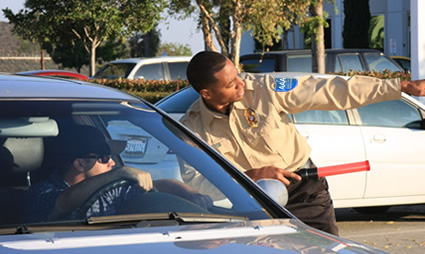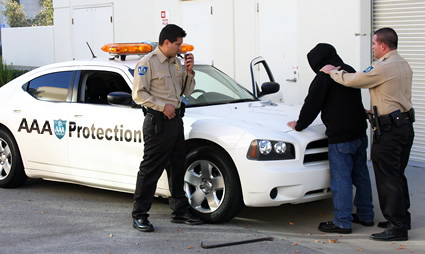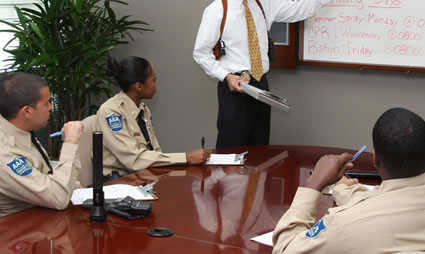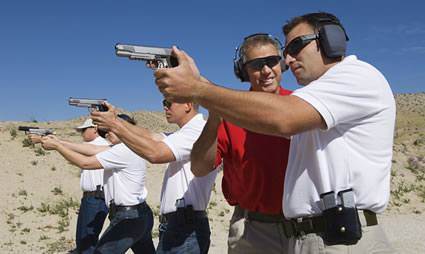 |
Security Officer and Security Guard Training |
Ever wondered how to become a security guard?
Minimum Requirements - After all, we can't avoid seeing one no matter where we are these days. Perhaps you've asked yourself how much they make or what qualifications they have. The private security industry in the United States is $202 billion large. That's a lot of security. Needless to say security personnel will always be needed, and in the work force all different skill levels exist. In most states, a security guard must be at least 18 years of age, have completed a fairly basic power of arrest course, and passed a state run background check. The applicant must be live scanned, and their FBI and DOJ records screened. Felony and some misdemeanor convictions are grounds for a license being denied. Certain states allow an applicant to submit a certificate of rehabilitation along with their security guard application packet, indicating the court has deemed them to have been rehabilitated and their prior felony offense(s) should not be used against them. The state reserves the ultimate right to accept or deny an application. We'll talk more about this later. Upon successful completion of the licensing process, an applicant is issued identification known as a Guard Card. The guard card must be carried with the security guard during all times they are on-duty.
Who Can Become a Guard? - A security guard applicant can be anyone who fits the state's security licensing requirements, e.g. age restrictions, high school / GED requirement, clean background. An applicant is not required to be employed, either presently or in the past, by any private security company. Any person at any time may enroll in a certified security training class and obtain the required power of arrest courses and/or additional mandated security training based on the state requirement. Upon successful completion of the licensing process, the applicant will receive his or her security guard license. For applicants who choose this method of licensing, their next step will be finding employment. This is the standard process of How to Become a Security Guard. There's a more common method however, and we'll describe that next.
Fast Track to Getting Licensed - The most common way to become a security guard is by getting hired at a private security company, even before applying for a security guard license. The private security company which hires you provides the required training and assists with the licensing application. They are able to do this because similar to a licensed security training institute, a private security company (officially known in most states as a private patrol operator or PPO) is allowed to teach power of arrest and skills classes. An applicant not yet licensed by the state as a security guard, can apply for work with a PPO and allow them to provide him or her with in-house training, thereby eliminating the need for the applicant to get security training on their own. The process is fast and efficient, and often a PPO will have it streamlined.
|
Can I get a security license if I have a record?
Certificate of Rehabilitation and Expungement - In most states a person is allowed to, for all intensive purposes, clear their name of criminal history by proving to the court that they have been successfully rehabilitated; usually 7 years after being released from custody. If you can prove you're not the person who committed a felony, at least 7 years ago, you have a chance at getting a Certificate of Rehabilitation. This official document should assist you when apply for a state license, such a security guard or most any license related to the security industry, e.g. PI, alarm, private patrol operator.
For those having not served time in state prison (convicted on wobblers or misdemeanors) you may want to consider asking the court for an Expungement. Having your record expunged is the equivalent of having your case dismissed. Expungements are typically allowed only when a person has been sentenced to probation with no jail time. Consult an attorney to learn which process is best for you.
|
What type of skills do I need?
As mentioned earlier, a private security company is allowed to offer security guard training. It should be noted though that this training usually is at the basic level and intended to simply fulfill the state's minimum requirement for security guard licensing. On a side note, a method which one can use to gauge the level of expertise a security company has to offer can be based on the level of in-house training the company offers its employees. It should be also noted that armed security guards and many professional security personnel will seek additional and more advanced security training through state licensed security training institutes. Firearms training, baton and pepper spray certification, and first-aid & CPR courses are usually available only through security training facilities.
Communication and Command Presence
 Communication - Effective communication with the public is fundamental to security. Properly addressing ones concern, speaking intelligently, and taking decisive action can de-escalate a situation rapidly. Communication skills are highly desired by employers. A security guard must have the ability to handle all security concerns in a polite, professional and disciplined manner. Proper use of language is a must. It often helps to be bilingual. Communication - Effective communication with the public is fundamental to security. Properly addressing ones concern, speaking intelligently, and taking decisive action can de-escalate a situation rapidly. Communication skills are highly desired by employers. A security guard must have the ability to handle all security concerns in a polite, professional and disciplined manner. Proper use of language is a must. It often helps to be bilingual.
Command Presence - A simple fact, really. It's the number one deterrent to crime. What do we mean? Command presence is essentially identifying yourself as a person with authority. After all you've been entrusted to look over the safety and security of people and/or property. How a criminal perceives you as a security officer will often dictate whether he or she chooses to contest your authority and possibly commit a crime. The decision is almost always made by a first impression. So, how do you build command presence? Simple. It starts with the uniform. Take time to dress for work like you would a formal event. Have your uniform pressed regularly, and your hair neatly trimmed. Good hygiene is a must. Next focus on your tools, mainly your sam or sally belt. Is your belt aligned? Are your tools in place and operational? And finally check your stance. Are you sitting or standing in an authoritative manner? If I'm a bad person, could I simply walk up to you and push you around? Hopefully your answer is no. Your stance and overall demeanor might be the deciding factor. From all the skills you can acquire as a security guard, building your command presence should be number one. It is the cornerstone of a professional security officer.
Verbal Judo - Verbal Judo by definition is the "use of words to conquer scared and irrational people". Verbal judo is used in an effort to generate voluntary compliance with individuals who may be combative or irate. Its core premise is to be an effective listener, and understand the subjects complaint and/or concern. If the matter is criminal in nature, verbal judo teaches to gain compliance through communication rather than physical force. Verbal judo classes are offered both online and at security training institutes, community colleges, and vocational schools.
|
|
|
Observation, Report Writing, and Response
 Expert Observer - Though an excellent crime deterrent, a security guard's main duty is not to interfere in a criminal act, yet to detect and observe it. Security guards are often not equipped to stop criminal activity on their own. The job is best left to trained law enforcement. A security guard's observation skills however are invaluable, often leading to expedited identification and/or arrest(s). There are security classes which can teach you how to become a better observer, but it all starts with being alert and non-complacent. Most importantly, making sure you always have a pen and paper, maybe a camera, or even sound recorder handy. The information you report may very well be used in court.
Expert Observer - Though an excellent crime deterrent, a security guard's main duty is not to interfere in a criminal act, yet to detect and observe it. Security guards are often not equipped to stop criminal activity on their own. The job is best left to trained law enforcement. A security guard's observation skills however are invaluable, often leading to expedited identification and/or arrest(s). There are security classes which can teach you how to become a better observer, but it all starts with being alert and non-complacent. Most importantly, making sure you always have a pen and paper, maybe a camera, or even sound recorder handy. The information you report may very well be used in court.
Report Writing Ability - Sooner or later in your security career you will need to write an incident report. The report will include your observations and actions. You will need to articulate what you saw, and do so accurately and in an order structure which references a timeline. The incident report you write will almost certainly be included as evidence should the matter involve the courts. Brush up on your grammar and spelling now. Write your reports neatly and in a structured manner. More than likely your employer will have an incident report template for you to use, however no two real-life incidents use a template, and for that reason you will find writing incident reports much easier if your language skills are up to par. Most security training institutes offer report writing classes. Take advantage of this training.
Prepared to Respond - In an emergency, you may be looked at for assistance first. Whether you are required to provided help or not might not seem as overwhelming enough as assisting those that need emergency attention, and you might do so at your own risk. Being prepared for an emergency will keep you and the people or property you have been tasked with securing, safer. Know where all exits and entrances are. Know how to operate the alarm panel, if one exists. Find out who the local law enforcement is and how to contact them. Jot down the addresses of nearby hospitals. If the location is equipped with gas lines, know how to shut them off. The same applies to electricity. Your safety and the safety of others may depend on your ability to quickly recognize an emergency and build a safety strategy. It starts with being highly familiar with the environment you are working in. Speaking with someone who is familiar with the area will be invaluable. Emergency preparedness training classes offered at security training institutes may include response to: Floods, Fires, Thunderstorms, Extreme Cold, Extreme Heat, Earthquakes, Landslide and Debris Flows, Wildfires, Hazardous Materials Incidents, and Terrorism (including Explosion, Biological, Chemical, and Radiological Hazards).
|
|
|
Emergency Health Assistance
 CPR (Cardiopulmonary Resuscitation) - Cardiopulmonary resuscitation (CPR) is a combination of rescue breathing and chest compressions delivered to victims thought to be in cardiac arrest. This is standard training for most professional security companies. They will usually hire an on-site instructor to come in and teach the class. Check with the company you intent to hire on whether their guards are CPR certified or not. If you're a security guard and want certification, getting a CPR card on your own is not expensive and usually takes 4 hours. Courses are available at most American Red Cross (ARC) locations, community colleges, and security training institutes. Annual CPR training is recommended by the Red Cross. CPR (Cardiopulmonary Resuscitation) - Cardiopulmonary resuscitation (CPR) is a combination of rescue breathing and chest compressions delivered to victims thought to be in cardiac arrest. This is standard training for most professional security companies. They will usually hire an on-site instructor to come in and teach the class. Check with the company you intent to hire on whether their guards are CPR certified or not. If you're a security guard and want certification, getting a CPR card on your own is not expensive and usually takes 4 hours. Courses are available at most American Red Cross (ARC) locations, community colleges, and security training institutes. Annual CPR training is recommended by the Red Cross.
First Aid - First Aid courses teach security guards how to recognize and care for emergencies such as cuts, burns, bites, scrapes, sudden illnesses, heat and cold emergencies, and head, neck, or back injuries. Though we mention, a security guard's primary duty is to observe and report, there may very well be times which require a guard to take action. An officer must be well trained. Certain work locations and/or employers may even require a security guard to be first aid and CPR certified. Whether or not first-aid training is required, taking this class is invaluable to your personnel well being and those around you. An excellent skill set to posses as a professional security officer.
|
|
|
Firearm and Weapons Certification
 Firearms Training - You'll more than likely see armed security officers at places which are considered high risk. Firearms training facilities are located through out the country and offer their respective state's required firearm training classes. All states require annual firearms re-certification. An armed guard can usually make around $8.00 more an hour, which is a fairly substantial increase from that of an unarmed security officer's hourly wage. Keep in mind, if you're interested in getting your firearm license, you may also want to consider becoming baton and pepper spray certified. Earlier we discussed command presence. Having these tools adds to your professionalism and expertise. Some PPOs, and most all who provide security patrol services, require their personnel to be firearm licensed. Please remember that carrying a weapon comes with the great responsibility of protecting lives. Firearms Training - You'll more than likely see armed security officers at places which are considered high risk. Firearms training facilities are located through out the country and offer their respective state's required firearm training classes. All states require annual firearms re-certification. An armed guard can usually make around $8.00 more an hour, which is a fairly substantial increase from that of an unarmed security officer's hourly wage. Keep in mind, if you're interested in getting your firearm license, you may also want to consider becoming baton and pepper spray certified. Earlier we discussed command presence. Having these tools adds to your professionalism and expertise. Some PPOs, and most all who provide security patrol services, require their personnel to be firearm licensed. Please remember that carrying a weapon comes with the great responsibility of protecting lives.
Baton Certification - Back in the day it was the PR-24. More recently we've moved to the ASP or expendable baton. A basic baton certification course will cover how to carry a baton properly, how to draw the baton, and how to use it effectively as a striking tool. The baton is an impact weapon. The training institute will have a force chart indicating which parts of the body should be struck under what types of circumstances. Based on threat level, a security guard must decide how to use this tool. Striking vital organs may cause serious injury and/or death.
Pepper Spray Certification - In most states, a security guard can not carry a chemical agent such as pepper spray or mace without first having completed an approved chemical agent course. The typical course will cover the legal aspects of using a chemical agent as well as effective use techniques. Subject matter should include learning when and if to use pepper spray, tactical advantages, proper handling of the agent, and how to deal with the after effects of exposure. Pepper spray permit courses may be taken both online and at state licensed training facilities.
|
|
|
|
SGE™ Security Guard Skill Levels
|
 |
Unarmed Security Guards & Officers
- Uniform
- Badge
- Name Tag
- Cell phone
- Handcuff
- First Aid Kit
- Security Log Book
Compare Quotes for Unarmed Security
|
|
 |
Armed Security Guards & Officers
- All Level I Gear
- Baton
- Utility Knife
- Pepper Spray
- Handcuffs (2-Sets)
- Armored Vest
- Handgun 9mm/40cal/45cal
Compare Quotes for Armed Security
|
|
 |
Off-Duty Police Personnel
- All Level II Gear
- Business Attire
- Concealed Weapon
- Investigation Tools
- Police Officer Status
- Uniform - Executive/Military
- Tactical Gear (if required)
Compare Quotes for Off-Duty Police
|
|
 |
Executive Protection Personnel
- All Level III Gear
- Business Attire
- Concealed Weapon
- Investigation Tools
- Travel Ability
- VIP Services
- Armed Transportation
Compare Quotes for VIP Protection
|
|
|
|
|

